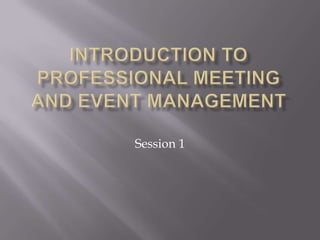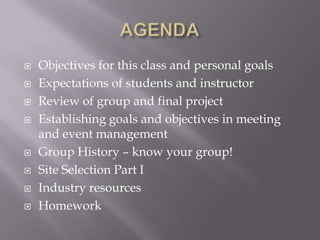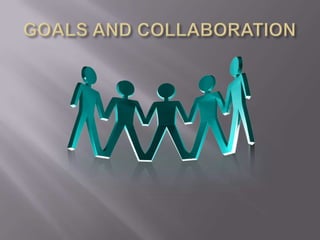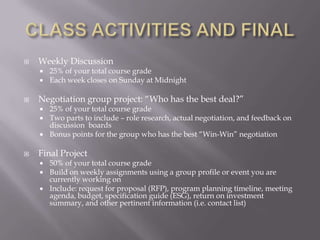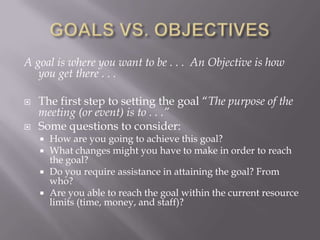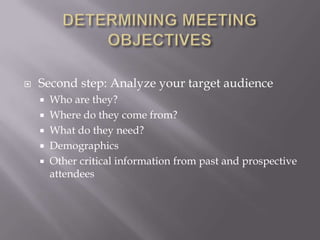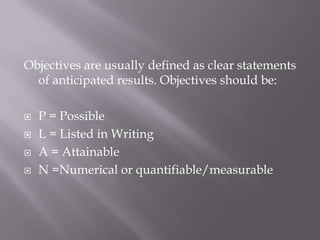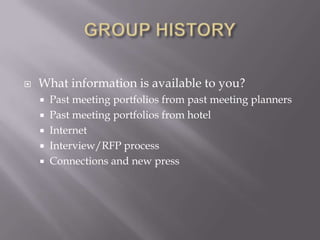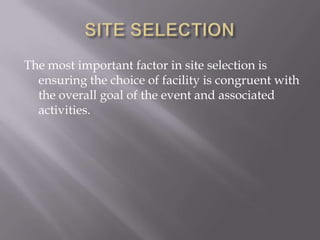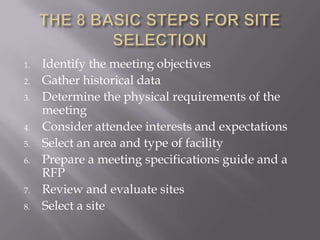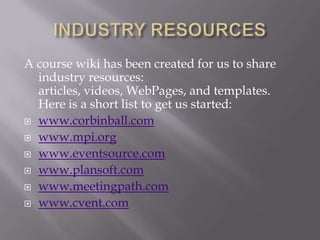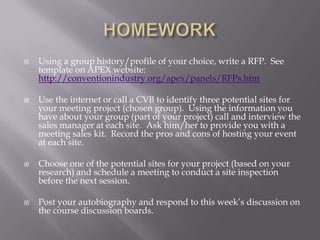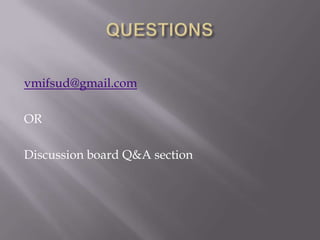Introduction to professional meeting and event management
- 1. Introduction to professional meeting and event managementSession 1
- 2. AGENDAObjectives for this class and personal goalsExpectations of students and instructorReview of group and final project Establishing goals and objectives in meeting and event managementGroup History ŌĆō know your group!Site Selection Part IIndustry resourcesHomework
- 4. CLASS ACTIVITIES AND FINALWeekly Discussion25% of your total course gradeEach week closes on Sunday at MidnightNegotiation group project: ŌĆ£Who has the best deal?ŌĆØ25% of your total course gradeTwo parts to include ŌĆō role research, actual negotiation, and feedback on discussion boardsBonus points for the group who has the best ŌĆ£Win-WinŌĆØ negotiationFinal Project50% of your total course grade Build on weekly assignments using a group profile or event you are currently working onInclude: request for proposal (RFP), program planning timeline, meeting agenda, budget, specification guide (ESG), return on investment summary, and other pertinent information (i.e. contact list)
- 5. GOALS VS. OBJECTIVESA goal is where you want to be . . . An Objective is how you get there . . .The first step to setting the goal ŌĆ£The purpose of the meeting (or event) is to . . .ŌĆØSome questions to consider:How are you going to achieve this goal?What changes might you have to make in order to reach the goal?Do you require assistance in attaining the goal? From who?Are you able to reach the goal within the current resource limits (time, money, and staff)?
- 6. DETERMINING MEETING OBJECTIVESSecond step: Analyze your target audienceWho are they?Where do they come from?What do they need?DemographicsOther critical information from past and prospective attendees
- 7. Objectives are usually defined as clear statements of anticipated results. Objectives should be:P = PossibleL = Listed in WritingA = AttainableN =Numerical or quantifiable/measurable
- 8. GETTING THE SCOOP!Focus Group: Usually 8-10 randomly selected members of the organization can help determine the priorities of the target audience. Surveys or Questionnaires: Low cost and can reach hundreds of people. This can be done electronically or by print either on site or after the meeting (also pre-meeting or a needs assessment)Past Profiles:Previous meetings or events for the group
- 9. GROUP HISTORYWhat information is available to you?Past meeting portfolios from past meeting plannersPast meeting portfolios from hotelInternetInterview/RFP processConnections and new press
- 10. SITE SELECTIONThe most important factor in site selection is ensuring the choice of facility is congruent with the overall goal of the event and associated activities.
- 11. THE 8 BASIC STEPS FOR SITE SELECTIONIdentify the meeting objectivesGather historical dataDetermine the physical requirements of the meetingConsider attendee interests and expectationsSelect an area and type of facility Prepare a meeting specifications guide and a RFPReview and evaluate sitesSelect a site
- 12. INDUSTRY RESOURCESA course wiki has been created for us to share industry resources: articles, videos, WebPages, and templates. Here is a short list to get us started:www.corbinball.comwww.mpi.orgwww.eventsource.comwww.plansoft.comwww.meetingpath.comwww.cvent.com
- 13. HOMEWORKUsing a group history/profile of your choice, write a RFP. See template on APEX website: http://conventionindustry.org/apex/panels/RFPs.htmUse the internet or call a CVB to identify three potential sites for your meeting project (chosen group). Using the information you have about your group (part of your project) call and interview the sales manager at each site. Ask him/her to provide you with a meeting sales kit. Record the pros and cons of hosting your event at each site.Choose one of the potential sites for your project (based on your research) and schedule a meeting to conduct a site inspection before the next session.Post your autobiography and respond to this weekŌĆÖs discussion on the course discussion boards.
- 14. QUESTIONSvmifsud@gmail.comORDiscussion board Q&A section
Editor's Notes
- #2: Welcome to the Introduction to Professional Meeting and Event Management Course. Throughout this course you will learn the basic skills and concepts needed to plan successful meetings. You will work through the logistics of building a meeting plan to gain an overall understanding of contract negotiation, menu planning, budgeting, site selection, and on-site management. The importance of relationship building will also be discussed.This course is geared for those who do not have formal training in the industry and are either currently planning meetings on a full time basis or as part of another function in the companies.
- #3: The agenda for this session is to cover some housekeeping items and then dive into some course content. On a housekeeping note, we will go over the objectives and expectations for the course as well as your own and review the group and final project. Then we will jump into conversation about meeting goals and objectives, group history, and site selection. I will end the session with a few of my favorite industry websites and talk a little bit about the homework due next week, which is also outlined in the syllabus.
- #4: The overall goal for this course is for you to gain an understanding of how to design a successful meeting from inception to completion and all aspects involved. Throughout the course you will engage in activities that will simulate real-world application of the phases of planning a meeting. These activities will build on each other and will result in your final project.You will find that being a meeting planner is a very social occupation. You must be able to work closely with people who have different backgrounds, working styles, and vision. Networking and collaboration is the cornerstone to successful meetings. With this, I would like to create our own mini-network that I hope will be useful in this course and beyond. Please post an autobiography to include your level of experience in the meetings industry and what your personal goals are for this course. Also, please indicate if there are topics you wish to see covered in this course.While there are structured activities and topics essential to the course, I would like to make sure we cover topics that are relevant to the work you are currently doing. And, of course, feel free to include your background, interests, hobbies, and your current location.
- #5: Each week you are expected to:Review the weekŌĆÖs learning objectivesComplete all assigned readings Complete all lecture materials for the weekParticipate in the discussion boardComplete and submit all assignments by due dates as listed on the syllabusA discussion question/topic will be posted each week. Participation is required and is worth 25% of your total course grade. The idea is for you to provide your thoughts and ideas about the readings or assignments in a way that elicits conversation.The group project is a way for you and other members of the class to demonstrate your understanding of different perspective in the contract phase of the meeting planning process. It will also provide you a glimpse of what to expect when talking with venues and vendors and provide you with the skills to interact with them successfully.This project will be divided into two parts.In part I, each student is assigned to a group and a role for a negotiation simulation. For example, you will be either the client, hotelier, or meeting planner. You will negotiate the terms of a contract based on the scenario presented. Track your rationale for your responses from the voice of your role on the discussion board. As a group you will later collate the responses into a summary for others to review. Each group will then have a chance to meet via Skype for a live negotiation meeting or a discussion to close the deal based on the email correspondence up to this point. Be prepared with your justifications. Remember to outline what your ŌĆśmust haveŌĆÖ are vs. what you would like and make a strong case for your asks. The goal is for a ŌĆ£win-winŌĆØ negotiation where everyone is happy and the goals of the meetings are not compromised.In part II, the week following the negotiation, each group will be able to review other groupŌĆÖs Skype session as well as the summaries which will be opened to all on the discussion board. You are required to comment on each group, offering comments about what you thought were good points and why and if something didnŌĆÖt go so well how you might have handled the negotiation. You do not have to comment in the ŌĆśvoiceŌĆÖ of the role you played in your small group.Your final project is the culmination of all of your weekly assignments which will be an activity that is a direct application of one phase of the meeting planning process. You will select a group you are currently working with to do this project. If you do not have a group and need a profile or meeting to focus on, please let me know and I will assign one. This project is worth 50% of your total grade and will be graded on the inclusion of all required materials, content showing understanding of meeting development, and effort put into the final project. This project is due on the final week of class and requires a written presentation. Students are encouraged to support one another and to share challenges and barriers they face as they move through each phase.
- #7: It is really important to know your audience for any given meeting or event. What if you donŌĆÖt know the group too well or itŌĆÖs a client you have never met before? How can you possibly get to know them especially if you donŌĆÖt work with them everyday?For example, lets say you are planning a meeting for employees at a large technology firm. The age ranges from 30-50year olds and the male to female ratio is 40/50. The employees attending are in various positions from administrative, to administrator, to senior management. So why is the aforementioned information important or useful? Well, it gives us a clue as to what activities we can include during the meeting or during down time; it also helps us to plan the menu ŌĆō maybe we can plan the cuisine around conference themes or vice versa; and it tells us something about the language we may want to use pre, during, and post-conversation with this particular group. We are not speaking to only higher ups who may speak a completely different language from the administrative staff or use a completely different set of acronyms. If you have organized a meeting for the particular group in the past you may ask yourself ŌĆō what venue did they use? What was the result? Has anything changed since then? For example, technology has had quite an impact on the way people are meeting and conducting business than it did even just 3 years ago. Will the group need to be introduced to new trends in meeting?? What was your budget? How did it work and what did NOT work?
- #8: Objectives are usually defined as clear statements of anticipated results.╠² Objectives should be:Possible ŌĆō are these realistic goals and do they match the actual needs of the client? Do client expectations for a meeting venue,╠²for example meet the objectives? If you are having a business meeting where people are flying in and out for short spurts of time╠²does it make sense to host the event in a tropical resort or perhaps at an airport hotel?Listed in writing ŌĆō this pertains to your contracts and as far as what your plan will be at execution of the meeting. Everything is╠²clearly documented. Documentation through each phase of the meeting planning process makes sure everything is tied to the╠²goals and objectives. Good check points. Through this course I will be sharing some template that are useful for documentations.╠²You may come across some of your own ŌĆō please share!Attainable ŌĆō are the goals attainable? Again, goes back to asking ŌĆō is this realistic? And what is the purpose of the meeting?And Numerical ŌĆō referring to the ability to measure the goals.╠² You are going to work within a budget ŌĆō you can measure and╠²quantify that ŌĆō you are going to make sure or work hard to get your numbers or that your target number for attendance is╠²achieved, and you will use evaluations to measure the success of the meeting or event.╠² All of these will contribute to your Return╠²on Investment which we will discuss later in the course.╠² The Return on Investment is what tells the company that having the╠²meeting had an impact and was worth it. This can be measured by the aforementioned and does not necessarily have to amount╠²to profit in dollars but could also be measured skill. For example, a training for physicians proves a decrease in the number of╠²return visits by a certain target of patients as a results of the skills learned from the training conference.╠²
- #9: So, how can we get to know a group well enough and in a short amount of time to plan a meeting that meets the goals and╠²objectives of the sponsoring client as well as those of the attendees?╠² You can conduct a focus group, usually comprised of 8-10╠²people randomly selected to help determine the audience priorities.╠² This is usually facilitated by a third party person or the╠²meeting planner if they do not work closely with the group or is not a direct stakeholder.Surveys and questionnaires is another way to collect data about a group.╠² It is increasingly easy today because of all the free╠²technology available╠² -╠² likewww.surveymonkey.com╠²or╠²www.eventbrite.com.╠²And finally ŌĆō past profiles.╠² Did you organize an event (if not the same one) for this group already? This goes back to the questions╠²we went over in a previous slide.╠² And if you did not plan for the group before ŌĆō who has???
- #10: Examining available information from past meetings will help you design a successful meeting program.╠² Hotels used for past╠²events can provide information on the room pick-up (or how many rooms per night were rented by your group) and check-in/check-out patterns.╠² Each property can provide reports on food and beverage, recreation, room service and housekeeping╠²requests. This information in not only helpful for you to plan accordingly to the goals and objectives of the meeting, but is╠²extremely helpful for contract negotiation.╠² For example, you can take a look at the data that hotels who have hosted the event or╠²group before.╠² Hotels and venues typically will hold the group information on file for 3-5 years. This is particularly helpful for╠²contract negotiation.╠² For example, I have a group that I host three conference exclusively at one hotel in Cambridge, MA.╠² One of╠²the programs was going into its 10th╠²year and we wanted to host a 10 year anniversary party and invite the alumni back.╠² By╠²requesting and reviewing previous year data, I was able to make a strong case for why the hotel should donate the space and╠²food to the group for the one evening.╠² I also explained that we have 6 future contracts signed and by looking at the group data,╠²the hotel would be making money from our participants in other places in the hotel ŌĆō for example, the auxillary spend was in the╠²spa, on site restaurant and bar, and in the business center.╠² With that they granted the request.╠² I tell you this story to demonstrate╠²that DATA IS KING.╠² It gives you something to fall back on with regard to value.Other ways to find information about a client you donŌĆÖt know well ŌĆō the internet, through connections/other meeting planners, and╠²new presses.
- #12: The 8 basic, yet essential, steps for site selection include:╠²1.Identify the meeting objectives2.Gather historical data3.Determine the physical requirements of the meeting4.Consider attendee interests and expectations5.Select an area and type of facility6.Prepare meeting specifications and a RFP7.Review and evaluation site8.Select a site9.Steps 1-5 inform step number 6, preparing the request for proposal.╠² The request for proposal outlines all the details and ŌĆ£must╠²havesŌĆØ for your event. It gives the hotel an overview of the event.╠² It includes the dates for your event, the guestroom block, the╠²number of VIPs, the needed amount of space, and the schedule for meals.╠² This is a broad yet some what detailed overview that╠²will help potential hotels bid for your business.╠² You can submit these online on specific hotel and property websites or you can go╠²through city Convention Visitors Bureaus and they can distribute on your behalf.╠² In your reading, a more detailed process is╠²outlined and a template is shared.
- #13: A number of details must be attended to pre, during, and post conference.╠² Luckily, there are a number of resources available to╠²meeting planners who are novice through seasoned.╠² Some of my favorite are listed here. As you work on your projects you may╠²come across some other great websites and resources. I encourage you to post them on the course wiki that I have created. The╠²wiki link can be found on the course homepage.
- #14: For this weeks board discussion please identify the property you chose for your project and describe how you chose it. How did the group profile play a role in your selection? Also, comment on the contents of your conference/sales kit. Was there anything in there that surprised you? What was missing? Why?
